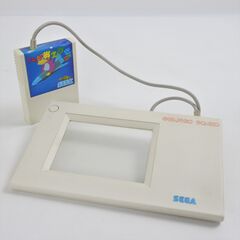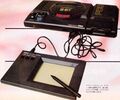Difference between revisions of "Sega Graphic Board"
From Sega Retro
m (spelling/grammar/fixes) |
|||
| Line 1: | Line 1: | ||
{{AccessoryBob | {{AccessoryBob | ||
| accessoryimage=SegaGraphicBoard.jpg | | accessoryimage=SegaGraphicBoard.jpg | ||
| − | | imgwidth= | + | | imgwidth=320 |
| − | |||
| − | |||
| maker=[[Sega]] | | maker=[[Sega]] | ||
| madefor=[[SG-1000]] | | madefor=[[SG-1000]] | ||
| − | | | + | | releases={{releases |
| − | | | + | | sg_date_jp=1985 |
| + | | sg_code_jp=GB-800 | ||
| + | | sg_rrp_jp=8,800 {{ref|http://sega.jp/archive/segahard/mk3/gb800.html}} | ||
| + | }} | ||
}} | }} | ||
The '''Sega Graphic Board''' is a peripheral for the [[SG-1000]], acting as a basic tablet. It was released in 1985 for a Japanese audience. | The '''Sega Graphic Board''' is a peripheral for the [[SG-1000]], acting as a basic tablet. It was released in 1985 for a Japanese audience. | ||
| Line 34: | Line 35: | ||
File:SegaGraphicBoard SG1000 JP Box Front.jpg|JP box (front) | File:SegaGraphicBoard SG1000 JP Box Front.jpg|JP box (front) | ||
</gallery> | </gallery> | ||
| + | |||
| + | ==External Links== | ||
| + | * [http://sega.jp/archive/segahard/mk3/gb800.html Sega of Japan catalogue page (Japanese)] | ||
| + | |||
{{SG1000}} | {{SG1000}} | ||
| − | + | [[Category:Unreleased Master System accessories]] | |
| − | [[Category:Unreleased Master System | + | [[Category:Unreleased Mega Drive accessories]] |
| − | [[Category:Unreleased Mega Drive | ||
Revision as of 16:42, 23 April 2012

| |||||
| Sega Graphic Board | |||||
|---|---|---|---|---|---|
| Made for: SG-1000 | |||||
| Manufacturer: Sega | |||||
|
The Sega Graphic Board is a peripheral for the SG-1000, acting as a basic tablet. It was released in 1985 for a Japanese audience.
The Sega Graphic Board's only real function is to allow Terebi Oekaki to work properly. Unlike other controllers, it is permanently attached to the Terebi Oekaki cartridge. The peripheral is limited for a number of reasons - the drawing area is small (10.8cm x 8cm) and the short lead means it can only be used if the player is very close to the console. As the SG-1000 can only output 16 colours on screen, the Terebi Oekaki software is also quite limited.
In order to use the Sega Graphic Board, the player requires a stylus (a black Sega-branded one was bundled with the unit). It requires more pressure than normal tablets in order for the console to receive a signal, however offers a thin and transparent drawing area to allow users to trace images.
Redesigned versions
Though it was never released in the west, the Sega Graphic Board made several appearances in western media and plans were made to bring improved versions to newer Sega consoles.
A slightly redesigned Graphic Board was set to be released in Europe as an accessory for the Sega Master System early in the console's lifespan. The original design was axed and replaced with a more appropriate black version, sporting an extra two buttons and most importantly, a DE-9 connector meaning it was not tied directly to a cartridge. Again, this black version was never released, however prototype versions have been spotted and seem to work.
Towards the end of the 1980s, a version of the Graphic Board for the Sega Mega Drive was planned. It is seen in photographs of early pre-production Mega Drive consoles, along with a Mega Drive Floppy Disk Drive and Mega Drive Keyboard.
Gallery
Sega Graphic Board linked to a prototype Sega Mega Drive
Physical Scans
- Error creating thumbnail: convert: Insufficient memory (case 4) `/home/sonicret/domains/segaretro.org/public_html/images/d/d1/SegaGraphicBoard_SG1000_JP_Box_Front.jpg' @ error/jpeg.c/JPEGErrorHandler/338. Error code: 1
JP box (front)
External Links
| Sega SG-1000 Hardware | |
| SG-1000 Variations | SG-1000 | SG-1000 II | SC-3000 | SC-5000 | Othello Multivision | Pasocom Gakushuudzukue | SD-G5 | Arcade | Soft Desk 10 |
|---|---|
| Add-ons | Super Control Station SF-7000 | 4 Color Plotter Printer | Data Recorder SR-1000 | Sega Keyboard |
| Game Controllers | Joystick (SJ-200) | Joystick (SJ-300) | Joypad (SJ-150) | SJ-151 | Handle Controller | Bike Handle | Sega Graphic Board | Pasoko-1000 |
| Misc. Hardware | Card Catcher | Extension Cable Kit (JC-100) | SD-80 | Sega Compact Floppy Disk |
| Unlicensed Clones | Dina 2 in one | Fullwis Video Game FR-II |



